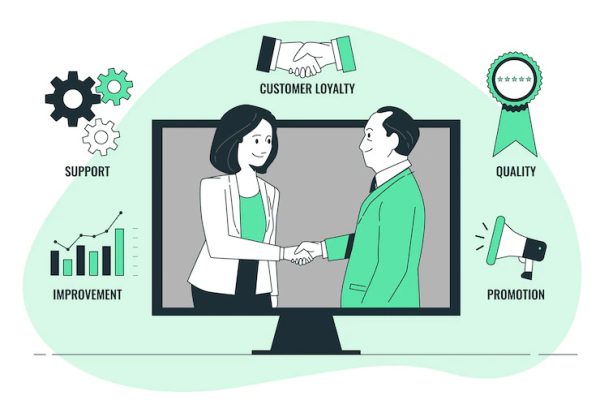As a photographer, you are constantly on the move, capturing the world’s beauty, and building relationships with your clients.
But with so many tasks to manage, it can be challenging to keep track of everything. That’s where a CRM (Customer Relationship Management) system comes in. A CRM system helps you manage your client relationships, keep track of appointments, and streamline your business operations.
In this blog, we will be discussing how to choose the best CRM for photographers and how it can help you take your business to the next level.
So, whether you’re a professional photographer or just starting out, read on to find the perfect CRM for you.
What is a CRM and Why Do You Need One?
A CRM is a software that helps you manage your business. It helps you to manage your customers and their data, sales processes and marketing campaigns.
In other words, it’s a tool that helps you run all areas of your business from one place.
A good CRM will help you:
- Manage relationships with existing customers through email marketing or social media platforms like Facebook or Instagram (which we won’t go into in this post).
- Schedule appointments with clients based on their preferences – whether they want to see an ad campaign before purchasing something online or not!
Have a Clear Picture of What You Need From a CRM, and That Will Help You Choose One.
The big step in choosing the best CRM for photographers is to understand your needs. There are many different types of CRMs, so it can be hard to know which one will meet your needs and help you achieve your goals.
To help you decide what type of software might work best for you, it’s important that you have a clear picture of what kind of information or data management system (DMS) would suit best.
Here are some questions that will help:
- What kinds of information do I need stored?
- How often do I update this data?
- Do I have multiple types of files stored on my computer or external drives like USB sticks, hard drives and memory cards?
- What about mobile devices such as smartphones or tablets – do they also contain valuable data that needs storing somewhere else too?
Is the CRM Platform Adaptable to Your Needs?
The CRM platform you choose will be the starting point for your business. It’s important to make sure you have a platform that will work for you and your business needs.
Here are some tips for finding a CRM platform that is adaptable for photographers:
- Identify your needs: Before choosing a CRM platform, it’s important to understand what specific needs you have as a photographer. This could include client management, project tracking, marketing automation, and more.
- Research available options: Research different CRM platforms that cater to photographers and compare their features, pricing, and customer reviews.
- Check for integration: Make sure the CRM platform you choose integrates with other marketing tools and software you use, such as email marketing platforms, payment systems, and photo editing software.
- Consider scalability: As your business grows, you may need a CRM platform that can adapt to your changing needs. Look for a platform that can scale with you as you grow.
- User-friendliness: Consider how user-friendly the platform is. A CRM platform with a user-friendly interface will be easier to use and more likely to be adopted by your team.
- Customer support: Look for a platform that offers excellent customer support. This is especially important in case you run into any issues and need help.
- Cost: Consider the cost of the CRM platform and whether it is within your budget. Some CRM platforms offer a free version or a free trial, which can be a good way to test them before committing.
Can You Integrate It With Other Tools That You Use?
In addition to the functionality, you want to make sure that your CRM can integrate with other tools you use.
For example, if you’re a photographer who also sells prints and has an online store on Etsy, it’s important for your CRM to be able to import contacts from there as well. This way, when someone makes an order for prints via your store page or email newsletter sign-up form in their inbox (which is where they should receive all marketing materials).
They’ll automatically be added as a contact within their CRM—and not just any old contact: one specifically related back to the purchase they just made at Etsy!
If this sounds like something that would be useful for photographers too… maybe even better than having an automated system where all customers get sent “Thank You” emails regardless of whether or not anything was purchased?
Well then maybe it’s worth exploring further into what else might work best here before making any final decisions about which platform would best suit both parties involved!
Is the Crm Secure and Reliable?
To determine whether your CRM is secure and reliable, you should look at the following:
- The company’s website. If a company has a bad reputation online, it’s unlikely they can keep their data safe.
- Other reviews of the same product or service on websites like Amazon or Yelp—this should give you an idea of how other people have experienced working with them in the past.
If there are no immediate red flags, consider asking yourself these questions:
- How often do I interact with my customers?
- How easy is it for them to contact me when they need something?
- What kind of support do I receive from this vendor if there’s an issue with one of my products/services?
These are just some examples but will help give context as well as insight into whether this product/service fits within your needs and expectations
How Much Does It Cost, and Does It Include All the Features I Need?
When you’re in the market for a CRM, price is important. But it’s not the only factor to consider. You should also look at the cost of each feature and make sure that you’ll get what you need out of your CRM.
If there’s a feature that isn’t included in the base price of an app, ask yourself if it’s worth paying extra for?
The answer will depend on how much value you expect from it (and whether or not it’s necessary). If not, then maybe one of these apps would be better suited for your needs:
How Can CRM Benefit Photographers?
A CRM system can benefit photographers in several ways:
- Improved client management: It can help photographers keep track of their clients’ information and history, making it easier to follow up with them and maintain good relationships.
- Increased efficiency: With CRM, photographers can automate repetitive tasks, such as sending follow-up emails, freeing up time for more important tasks like taking photos.
- Better sales and marketing: CRM can assist photographers with targeted marketing efforts, such as sending promotions to specific groups of clients based on their interests and previous purchases.
- Improved collaboration: CRM can provide a central hub for photographers to collaborate with their team, allowing for better communication and more efficient workflow.
- Increased profitability: By better managing clients and streamlining their workflow, photographers can increase their chances of closing more sales and ultimately increase their profits.
How to Choose the Best CRM for Photographers
You’re looking to build a CRM for your business and it seems like there are so many options. You want to make sure that the platform is scalable and adaptable enough to grow with your needs, but also secure and reliable.
Let’s take a look at these 4 steps to choose the best CRM for photographers.
Step 1: Understand Your Needs
Before you start your search for the best CRM for photographers, it’s important to understand what your needs are. To do this, you should define your goals and know what features are most important to you.
Then, use this information as a guide when evaluating different options and deciding which one is right for you.
For example: A photographer who wants everything but can’t afford it will probably prefer an application that offers fewer advanced features but comes with a reduced price tag than another app that has more advanced functionality but costs more money upfront.
Step 2: Analyze Your Current Process, Workflow and Goals
The next step is to analyze your current process and workflow. This can be done by taking a close look at how you already work, or by asking other professionals in the industry what their processes are like.
Once you have a good understanding of these things, it’s time to start thinking about the goals and needs of your business.
- How many hours do you spend on projects per week?
- How much time do clients spend waiting for responses from you?
- What features would improve efficiency/accessibility in terms of communication with clients or photographers?
These questions will help guide which CRM best suits your needs as an organization.
Step 3: Compare Different CRM Softwares
Now that you have a better idea of what to look for, let’s go ahead and compare the best CRM softwares.
- Features: The first thing to consider is what features each CRM software has. Some of them may not be able to do all the things they claim they can do. So, it’s important to check if it fits your needs in terms of cost or effectiveness.
- Pricing: Next up, find out how much these products cost—and whether there are any discounts available for photographers who want them now (or later). If possible try comparing prices across different websites. So, you know exactly how much money you’ll need to spend on this purchase!
- Customer reviews: It’s also worth reading through some customer reviews before making your final decision about which product works best for photographers like yourself. This will give insight into how many people like/dislike certain aspects about each program as well as giving an idea about whether other users had issues during installation/configuration etc.
Step 4: Select Your Favorite CRM for Photographers!
Now that you’ve got a better idea of what to look for in a CRM, it’s time to select your favorite. Choosing the right CRM can be tricky because there are so many options out there.
Here are some things to consider:
- Cost – The cost of your CRM should be affordable and in line with your budget. You don’t want to spend more money than necessary on something only to find out later that it didn’t meet all of your needs or wasn’t user-friendly enough for you!
- Features – Some features might seem like they would make sense but aren’t actually needed in order for them to work well with photographers’ workflow (iPod integration). You should also consider whether an app has any extra bells and whistles like analytics tools built into its dashboard which could help improve customer satisfaction levels over time as well as provide additional value beyond just tracking leads/clients etc.
Why is HubSpot the Best CRM for Photographers?
HubSpot is considered to be one of the best CRMs for photographers because it offers a range of features that are specifically designed to help photographers manage their customer relationships and streamline their sales process.
Some of these features include:
- Contact management: HubSpot allows photographers to easily manage and organize their contacts, leads, and customers in one central place.
- Lead capture and nurturing: With HubSpot’s lead capture and nurturing tools, photographers can automate their sales process and effectively communicate with potential customers.
- Marketing automation: HubSpot’s marketing automation capabilities help photographers to create targeted and personalized email campaigns, social media posts, and landing pages to attract and convert more leads into customers.
- Analytics and reporting: It provides real-time analytics and reporting, which allows photographers to measure the success of their marketing and sales efforts and make data-driven decisions.
- Integrations: It integrates with a wide range of other tools and platforms, including payment processors, email marketing tools, and more, making it easy for photographers to manage all aspects of their business from one central location.
HubSpot’s combination of contact management, lead capture and nurturing, marketing automation, analytics and reporting, and integrations. It is an ideal CRM for photographers looking to grow their business and manage their customer relationships effectively.
Conclusion
Hopefully, this article will help you find the perfect CRM for your needs. If you are looking for an easy to use, functional, and affordable CRM to streamline your business process then the HubSpot can be an ideal selection. It comes with all you need.
Sign up now and enjoy FREE trial.
We hope you are acknowledged how to choose the best CRM for photographers.





